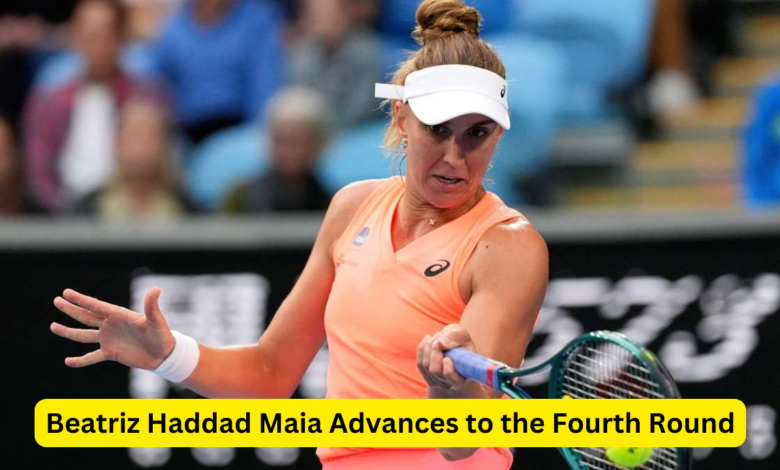Beatriz Haddad Maia Advances to the Fourth Round

The US Open is known for its dramatic moments and unexpected twists, and the recent controversy surrounding Beatriz Haddad Maia’s advancement to the fourth round is no exception. This article delves into the specifics of the incident, the broader implications for the tournament, and what this means for the players and fans involved.
The Controversial Decision: What Happened?
On a recent match day at the US Open, Beatriz Haddad Maia faced off in a high-stakes match that ultimately saw her advance to the fourth round under contentious circumstances. The match’s pivotal moment revolved around a video review decision that has sparked significant debate among tennis enthusiasts and analysts alike.
In the heat of the match, a crucial point was challenged, and the resulting video review became the focal point of controversy. The decision, which allowed Haddad Maia to advance, was scrutinized for its accuracy and fairness. The controversy stems from differing interpretations of the video evidence and the perceived inconsistency in how similar situations have been handled in the past.
The Role of Video Review in Tennis
Video review technology, also known as Hawk-Eye, has been instrumental in modern tennis, providing players and officials with a tool to ensure fairness in the sport. However, this technology is not without its flaws. In this case, the video review decision became a flashpoint for discussion about the reliability of such systems.
Hawk-Eye Technology: How It Works
Hawk-Eye uses a series of high-speed cameras positioned around the court to track the trajectory of the ball. The system creates a 3D representation of the ball’s path, which helps officials determine whether the ball was in or out. Despite its advanced technology, Hawk-Eye is not infallible. Errors can occur, and the interpretation of the data can sometimes be subjective, leading to controversies like the one involving Haddad Maia.
Challenges and Criticisms
One of the main criticisms of video review technology is the potential for inconsistent application. Different matches may experience varying standards of review, which can lead to perceptions of unfairness. The technology’s dependence on camera angles and the quality of the video feed can also impact the accuracy of the decision.
Impact on Beatriz Haddad Maia’s Career
For Beatriz Haddad Maia, the controversy surrounding her advancement has broader implications for her career. The Brazilian player, who has made significant strides in her professional career, now finds herself at the center of a debate that could impact her reputation and future performances.
Short-Term Implications
In the short term, the controversy may affect Haddad Maia’s confidence and focus. While she has advanced to the fourth round, the manner in which she did so could create additional pressure and scrutiny. The immediate reaction from fans and critics alike could influence her preparation and performance in the upcoming rounds.
Long-Term Effects
Long-term, the controversy may shape how Haddad Maia is perceived within the tennis community. It could affect her relationships with other players, coaches, and officials. Additionally, the situation highlights the ongoing debate about fairness and technology in sports, which could lead to broader discussions and potential changes in how video reviews are conducted.
Reactions from the Tennis Community
The tennis community has been vocal in its response to the controversy. Players, coaches, and commentators have shared their perspectives on the decision and its implications. This section provides a snapshot of the diverse opinions and reactions that have emerged.
Player Reactions
Several players have expressed their opinions on the incident, with some supporting Haddad Maia and others questioning the fairness of the decision. These reactions often reflect broader concerns about how technology and officiating affect the integrity of the game.
Media and Commentator Perspectives
Media outlets and tennis commentators have also weighed in, offering analyses and critiques of the decision. These perspectives provide valuable insights into the broader implications of the controversy and its impact on the tournament’s credibility.
Looking Ahead: What’s Next for the US Open?
As the US Open progresses, the tournament’s organizers and officials will need to address the fallout from the controversial decision. Ensuring the integrity of the competition and maintaining the confidence of players and fans will be crucial.
Potential Changes to Review Processes
The controversy may prompt a review of the video review processes and technology used in the tournament. Discussions about improving accuracy and consistency in decision-making could lead to changes in how video reviews are conducted in future matches.
Impact on Future Tournaments
The outcome of this controversy could influence how other tournaments handle similar situations. The tennis community will be watching closely to see if this incident leads to broader changes in the sport’s approach to technology and officiating.
Fan Reactions and Social Media Buzz
The reaction from tennis fans and the broader public has been intense and varied. Social media platforms have been abuzz with discussions, debates, and opinions about the controversial decision involving Beatriz Haddad Maia. Fans have taken to Twitter, Instagram, and other platforms to express their views, ranging from support for Haddad Maia to criticisms of the video review system. The widespread engagement highlights the passionate nature of tennis fans and underscores the impact of high-profile decisions on public perception.
Social Media Influence
Social media has amplified the reach and intensity of the debate. Hashtags related to the controversy have trended, and viral posts have further fueled the discussion. This digital engagement not only reflects the strong opinions held by fans but also influences the narrative surrounding the incident. The role of social media in shaping public perception and its potential impact on future decisions in the sport are key aspects to consider as the controversy unfolds.
Historical Context: Similar Controversies in Tennis
The situation with Beatriz Haddad Maia is not an isolated incident. Tennis has seen its share of controversial moments related to officiating and technology. Historical instances, such as disputes over line calls or questionable rulings in critical matches, have similarly sparked debates and calls for change.
Past Controversies and Their Outcomes
Looking back at previous controversies, the responses and resolutions often vary. Some incidents have led to reforms or adjustments in how technology and officiating are handled, while others have resulted in ongoing discussions without significant changes. Understanding these historical precedents provides context for the current situation and may offer insights into how it might be resolved or addressed in the future.
Conclusion
The controversy surrounding Beatriz Haddad Maia’s advancement in the US Open highlights the complexities and challenges of modern sports technology. While video review systems like Hawk-Eye are designed to enhance fairness, they are not immune to criticism and error. As the tournament progresses, the focus will remain on how the situation is addressed and what it means for the future of tennis.





2 Comments